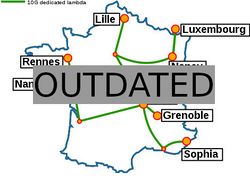Grid5000:Home
|
Grid'5000 is a large-scale and versatile testbed for experiment-driven research in all areas of computer science, with a focus on parallel and distributed computing including Cloud, HPC and Big Data. Key features:
Older documents:
|
Random pick of publications
Five random publications that benefited from Grid'5000 (at least 2779 overall):
- Wedan Emmanuel Gnibga, Anne Blavette, Anne-Cécile Orgerie. Energy-related Impact of Redefining Self-consumption for Distributed Edge Datacenters. IGSC 2024 - 15th International Green and Sustainable Computing Conference, Nov 2024, Austin, United States. pp.1-7, 10.1109/IGSC64514.2024.00011. hal-04770489 view on HAL pdf
- Maxime Agusti, Eddy Caron, Benjamin Fichel, Laurent Lefèvre, Olivier Nicol, et al.. PowerHeat: A non-intrusive approach for estimating the power consumption of bare metal water-cooled servers. 2024 IEEE International Conferences on Internet of Things (iThings) and IEEE Green Computing & Communications (GreenCom) and IEEE Cyber, Physical & Social Computing (CPSCom) and IEEE Smart Data (SmartData) and IEEE Congress on Cybermatics, Aug 2024, Copenhagen, Denmark. pp.1-7. hal-04662683 view on HAL pdf
- Igor Fontana de Nardin. Ordonnancement en ligne de tâches IT et engagement de sources dans un centre de calcul alimenté par des énergies renouvelables. Réseaux et télécommunications cs.NI. Institut National Polytechnique de Toulouse - INPT, 2023. Français. NNT : 2023INPT0104. tel-04361471 view on HAL pdf
- Pierre Epron, Gaël Guibon, Miguel Couceiro. ORPAILLEUR SyNaLP at CLEF 2024 Task 2: Good Old Cross Validation for Large Language Models Yields the Best Humorous Detection. Working Notes of the Conference and Labs of the Evaluation Forum (CLEF 2024), Sep 2024, Grenoble, France. pp.1841-1856. hal-04696012 view on HAL pdf
- Can Cui, Imran Ahamad Sheikh, Mostafa Sadeghi, Emmanuel Vincent. End-to-end Multichannel Speaker-Attributed ASR: Speaker Guided Decoder and Input Feature Analysis. 2023 IEEE Automatic Speech Recognition and Understanding Workshop (ASRU 2023), Dec 2023, Taipei, Taiwan. 10.1109/ASRU57964.2023.10389729. hal-04235774 view on HAL pdf
Latest news
Failed to load RSS feed from https://www.grid5000.fr/mediawiki/index.php?title=News&action=feed&feed=atom: Error parsing XML for RSS
Grid'5000 sites
Current funding
As from June 2008, Inria is the main contributor to Grid'5000 funding.
INRIA |
CNRS |
UniversitiesUniversité Grenoble Alpes, Grenoble INP |
Regional councilsAquitaine |


